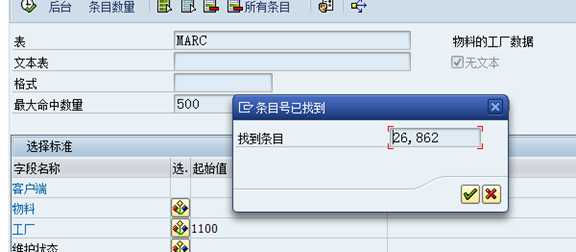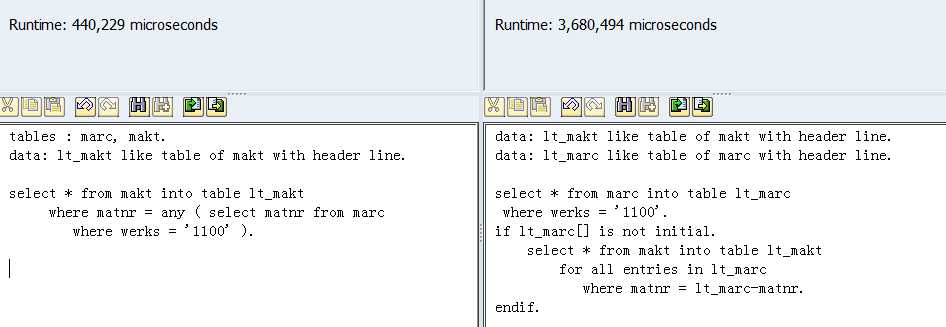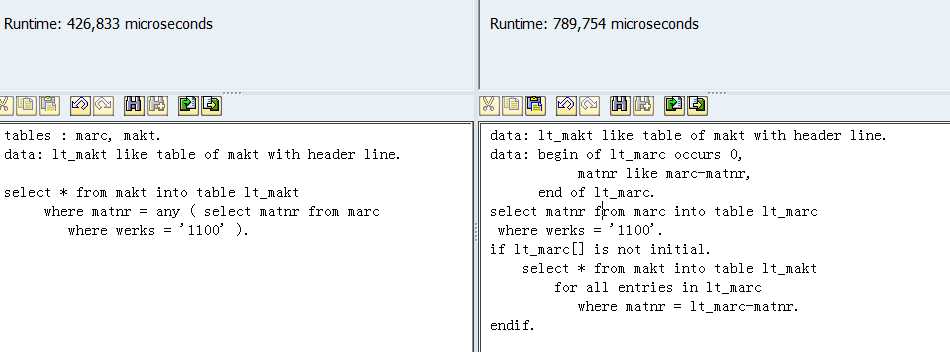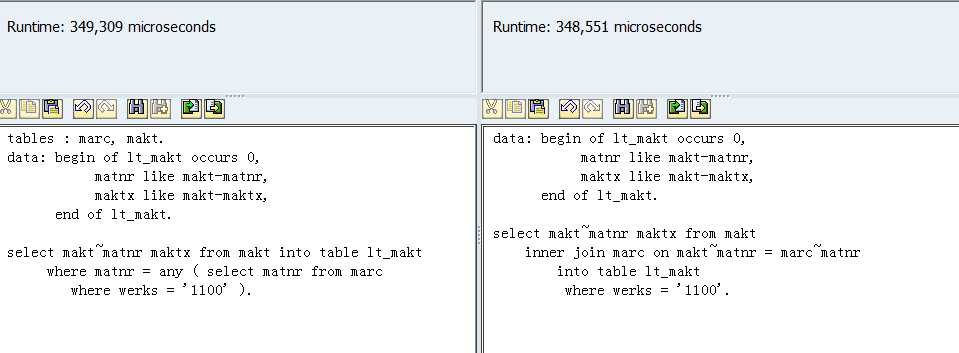标签:
导致的数据缺失
for all entries in
自动去除重复数据的问题
以前也遇到过 但是没有引起足够的注意
而且发生错误时都是隐性的
很难找
所以开发程序 使用all entries in的时候就要考虑到这个问题
多选几个关键字段来避免被删除
原理的分析:
1)for all entries的解析
使用or 来连接多个条件
例如: for all entries in i_tab where a = itab-a and b = i_tab-b
itab中两条记录
a1 ?b1
a2 ?b2
那么解析的sql语句中使用or连接
where ( a = a1 and b = b1 ) or ( a = a2 and b = b2 )
2)使用的限制
另外In的解析也是使用or
过多的or造成了sql语句的复杂度
导致查询优化器无法选择最优方案
反而可能选了个最差的方案 由此造成性能问题
为了避免这个问题
连接多少个or是有限制的
默认是10个
这样例如500条记录的内表 ,实际生成50个sql语句,
即使如此,还是存在复杂度过大的问题
于是极端的方案是设置分拆的数量为1个
这样就等效到loop中select了!!
也并不是我们想要的
-------------------------------------------------------------------------------------------------
提供一种解决方案:
有限条件下可以使用
for all entries in <itab>导致多次查询?
每次可能不慢 但是 <itab>的记录足够多
导致了瓶颈
如果业务允许 选取适合的条件
从目标table中抽取一次数据??for的目标结果是本次抽取的子集
是否需要过滤看实际需求 通常无须过滤
(提供一个过滤的思路 ?binary search + ?loop from to)
这样可以避免loop + loop的低效率
? ?
再增加一种解决方案
如果是单值的for all entries in?
查询大数据量的表
在外部使用range变量存储查询条件
单次看似增加了db的部分压力 ?但是整体上是有显著提升的
是查询次数就压缩到了一次
-------------------------------------------------------------------------------------------------
for all entries in的效率并不是很高
单方便 而且比loop中select 靠谱
每次select的开销 ?以及缓存的数据可能被清空
以及for底层可能也有优化 所以这个效率的提高是可以保证的
但是和使用连接查询 ?子查询相比 效率还是不如
个人分析如下:
?for使用的是分拆的方式去查询
每次查询的开销 ?竞争数据库连接 这是一个问题
另一个就是老外说的
不能找到最有执行计划 导致的cpu和i/o的消耗
Even?though?db2?has?mechanisms?like?buffer?pools?and?sequential?detection?to?try?to?minimize?the?i/o?cost?of?such?cases,?those?mechanisms?can?only?minimize?the?actual?i/o?operations?,?not?the?cpu?cost?of?re-reading?them?once?they?are?in?memory.?Had?you?coded?the?join,?db2?would?have?known?that?you?actually?need?500?rows?from?mara,?it?would?have?been?able?to?use?other?access?methods,?and?potentially?consume?less?getpages?i/o?and?cpu.?
? ?
即使在有索引的过程中?
按照老外的说法 也是有浪费的
Db2?will?be?able?to?perform?this?sql?statement?cheaply?all?50?times,?using?one?of?sap?standard?indexes?that?contain?the?matnr?column.?But?in?actuality,?if?you?consider?the?wider?picture?(all?50?executions?of?the?statement),?you?will?see?that?some?of?the?data?pages,?especially?the?root?and?middle-tire?index?pages?have?been?re-read?each?execution.?
是否可这么理解 ?500条记录中真正需要的可能只有三五条 比如 需要找公司供应商信息之类的
但是分拆导致每次都要查询 ?级联/子查询先得到了数据范围 有个优化过滤了重复查询
这个是个人设想的极端坑爹环境:
在没有索引的情况下
全表扫描
对于大量数据的表不能每次完整的读入内存
需要分页 假设某张大表 ?要分成10页
cpu消耗差不多
本来只要IO十次 ?每页一次
但for 假设分拆成十次
IO会达到100次?
? ?
? ?
? ?
===============================
使用for all entries
在查询的时候对应字段进行替换
内表中的字段部分属性会被丢弃
不能进行offset 等等之类的操作
? ?
for all entires 本质上还是多次拆分了查询
减少了几次查询的次数
但是并不能带来太大的效率提高
但是方便 逻辑处理 利于业务的展开及数据的处理
如果涉及效率问题并不见的有多好
子查询反而更有效果 ?

? ?

? ?

? ?

同时这里这个效率问题
可见数据的传输量 读取量也是很重要的
所以避免无效字段 减少磁盘IO 内存消耗 网络带宽 都应该是优化考虑的地方
================================================================
FOR ALL ENTRIES的效率问题??
2010-09-08 14:33:40|??分类:?ABAP|字号?订阅
All?abap?programers?and?most?of?the?dba‘s?that?support?abap?programmers?are?familiar?with?the?abap?clause?"for?all?entries".?Most?of?the?web?pages?I?visited?recently,?discuss?3?major?drawbacks?of?the?"for?all?entries"?clause:?
? ?
1.?duplicate?rows?are?automatically?removed?
2.?if?the?itab?used?in?the?clause?is?empty?,?all?the?rows?in?the?source?table?will?be?selected?.?
3.?performance?degradation?when?using?the?clause?on?big?tables.?
? ?
In?this?post?I‘d?like?to?shed?some?light?on?the?third?issue.?Specifically?i‘ll?discuss?the?use?of?the?"for?all?entries"?clause?as?a?means?to?join?tables?in?the?abap?code?instead?of?in?db2.?
? ?
Say?for?example?you?have?the?following?abap?code:?
Select?*?from?mara?
For?all?entries?in?itab?
Where?matnr?=?itab-matnr.?
? ?
If?the?actual?source?of?the?material?list?(represented?here?by?itab)?is?actually?another?database?table,?like:?
select?matnr?from?mseg?
into?corresponding?fields?of?table?itab?
where???
? ?
Then?you?could?have?used?one?sql?statement?that?joins?both?tables.?
Select?t1.*?
From?mara?t1,?mseg?t2?
Where?t1.matnr?=?t2.matnr?
And?T2?.?
? ?
So?what?are?the?drawbacks?of?using?the?"for?all?entires"?instead?of?a?join???
? ?
At?run?time?,?in?order?to?fulfill?the?"for?all?entries?"?request,?the?abap?engine?will?generate?several?sql?statements?(for?detailed?information?on?this?refer?to?note?48230).?Regardless?of?which?method?the?engine?uses?(union?all,?"or"?or?"in"?predicates)?If?the?itab?is?bigger?then?a?few?records,?the?abap?engine?will?break?the?itab?into?parts,?and?rerun?an?sql?statement?several?times?in?a?loop.?This?rerun?of?the?same?sql?statement?,?each?time?with?different?host?values,?is?a?source?of?resource?waste?because?it?may?lead?to?re-reading?of?data?pages.?
returing?to?the?above?example?,?lets?say?that?our?itab?contains?500?records?and?that?the?abap?engine?will?be?forced?to?run?the?following?sql?statement?50?times?with?a?list?of?10?values?each?time.?
Select?*?from?mara?
Where?matnr?in?(?...)?
? ?
Db2?will?be?able?to?perform?this?sql?statement?cheaply?all?50?times,?using?one?of?sap?standard?indexes?that?contain?the?matnr?column.?But?in?actuality,?if?you?consider?the?wider?picture?(all?50?executions?of?the?statement),?you?will?see?that?some?of?the?data?pages,?especially?the?root?and?middle-tire?index?pages?have?been?re-read?each?execution.?
? ?
Even?though?db2?has?mechanisms?like?buffer?pools?and?sequential?detection?to?try?to?minimize?the?i/o?cost?of?such?cases,?those?mechanisms?can?only?minimize?the?actual?i/o?operations?,?not?the?cpu?cost?of?re-reading?them?once?they?are?in?memory.?Had?you?coded?the?join,?db2?would?have?known?that?you?actually?need?500?rows?from?mara,?it?would?have?been?able?to?use?other?access?methods,?and?potentially?consume?less?getpages?i/o?and?cpu.?
? ?
In?other?words?,?when?you?use?the?"for?all?entries?"?clause?instead?of?coding?a?join?,?you?are?depriving?the?database?of?important?information?needed?to?select?the?best?access?path?for?your?application.?Moreover,?you?are?depriving?your?DBA?of?the?same?vital?information.?When?the?DBA?monitors?&?tunes?the?system,?he?(or?she)?is?less?likely?to?recognize?this?kind?of?resource?waste.?The?DBA?will?see?a?simple?statement?that?uses?an?index?,?he?is?less?likely?to?realize?that?this?statement?is?executed?in?a?loop?unnecessarily.?
? ?
In?conclusion?I?suggest?to?"think?twice"?before?using?the?"for?all?entries"?clause?and?to?evaluate?the?use?of?database?views?as?a?means?to:?
a.?simplify?sql?
b.?simplify?abap?code?
c.?get?around?open?sql?limitations.?
? ?
Omer?Brandis?
DB2?DBA?&?SAP?Basis?professional?(and?all?around?nice?guy)?
omerb@srl.co.il?
? ?
另外,附上NOTE?48230?
Summary?
? ?
Symptom?
Performance?problems?with?the?open?SQL?statement?"SELECT?...?FOR?ALL?ENTRIES?...".?
? ?
Other?terms?
FOR_ALL_ENTRIES?
? ?
Reason?and?Prerequisites?
The?open?SQL?statement?"SELECT?...?FOR?ALL?ENTRIES?..."?is?an?ABAP-specific?enhancement?of?the?SQL?standard.?This?variant?of?the?SELECT?statement?allows?the?ABAP?programmer?to?join?an?internal?program?table?with?one?or?several?database?tables.?(For?a?detailed?description?of?that?statement?type?please?refer?to?the?corresponding?ABAP?documentation.)?
Since?there?is?no?analogous?statement?in?the?SQL?standard,?the?open?SQL?statement?has?to?be?mapped?from?the?database?interface?of?the?ABAP?environment?to?one?or?several?semantically?equivalent?SELECT?statements?which?can?be?processed?by?the?DB?platform.?Several?profile?parameters?allow?a?definition?of?how?the?database?interface?should?carry?out?this?mapping?with?regard?to?the?database.?This?note?describes?the?parameters?that?can?be?used?to?control?the?"SELECT?...?FOR?ALL?ENTRIES"?statement?and?their?effect.?
? ?
Solution?
The?parameters?mentioned?in?this?note?have?considerable?effects?on?most?of?the?critical?database?commands?and?influence?the?performance?of?the?whole?system?to?a?great?extent.?For?this?reason,?before?changing?the?parameters?described?in?this?note,?a?detailed?problem?analysis?by?experienced?SAP?consultants?or?the?support?team?is?required.?Please?note?in?particular?that?changing?the?parameters?may?often?solve?a?local?performance?problem?but?it?may?also?cause?a?still?bigger?problem?to?occur?at?another?place.?For?this?reason,?prior?to?changing?the?profile?parameters?-?which?has?a?global?effect?on?all?statements?-?you?should?check?first?whether?the?performance?problem?might?be?caused?by?one?or?two?positions?in?the?corresponding?application?which?can?be?corrected?by?a?local?change?of?the?critical?SQL?statements.?
? ?
The?following?profile?parameters?are?available:?
? ?
rsdb/prefer_join?(ab?Release?7.0)?
???????????If?you?set?this?parameter?to?"1"?the?SELECT?...?FOR?ALL?ENTRIES?is?implemented?using?a?join.?Note?that?this?variant?is?only?supported?by?the?DB6?(DB2?UDB)?and?MS?SQL?Server?database?platforms.?
? ?
rsdb/prefer_union_all?
???????????You?can?override?this?parameter?using?rsdb/prefer_join?=?1.?The?following?remarks?relate?to?rsdb/prefer_join?=?0.?
? ?
? ?
???????????Setting?this?parameter?to?"1"?generates?a?linking?of?entire?statements?with?UNION;?setting?it?to?"0"?generates?an?OR?link?of?conditions?in?the?WHERE?clause.?Each?of?the?linked?partial?statements/conditions?represents?an?entry?of?the?input?table?[itab].?
? ?
For?Example:?
The?open?SQL?statement?
? ?
SELECT?...?FOR?ALL?ENTRIES?IN?itab?WHERE?f?=?itab-f.?
? ?
is?mapped?to?an?SQL?statement?which?is?consistent?with?the?standard:?
? ?
rsdb/prefer_union_all????????????=?0?
=>?
SELECT?...?WHERE?f?=?itab[1]-f?
??????????OR????f?=?itab[2]-f?
??????????...?
???????????OR????f?=?itab[N]-f?
? ?
rsdb/prefer_union_all????????????=?1?
=>?
??????????SELECT?...?WHERE?f?=?itab[1]-f?
UNION?ALL?SELECT?...?WHERE?f?=?itab[2]-f?
....?
UNION?ALL?SELECT?...?WHERE?f?=?itab[N]-f?
? ?
Where?N?is?the?number?of?rows?in?itab,?and?itab-f?is?the?value?of?
field?f?in?the?i-th?table?row.?
? ?
? ?
rsdb/prefer_in_itab_opt?
???????????If?this?parameter?is?set?to?"1",?a?statement?where?only?one?field?in?the?WHERE?clause?depends?on?the?converted?internal?table?is?reflected?by?a?statement?with?an?IN?clause.?However,?this?is?only?possible?if?the?field?reference?and?the?WHERE?condition?are?simple?enough:?in?essential?the?field?reference?must?be?a?not?negated?EQ?condition.?
? ?
For?Example:?
If?parameter?rsdb/prefer_in_itab_opt?is?set?to?"1",?the?open?SQL?
? ?
SELECT?...?FOR?ALL?ENTRIES?IN?itab?WHERE?f?=?itab-f.?
? ?
is?mapped?to?the?following?SQL?statement:?
? ?
SELECT?...?WHERE?f?IN?(itab[1]-f,?itab[2]-f,?...,?itab[N]-f)?
? ?
? ?
rsdb/max_blocking_factor?
???????????This?parameter?specifies?an?upper?limit?for?the?number?of?entries?taken?in?from?[itab]?to?be?processed?in?one?statement.?This?means?that?if?the?internal?table?specified?in?the?FOR?ALL?ENTRIES?clause?contains?more?than?rsdb/max_blocking_factor?rows,?the?open?SQL?statement?is?split?into?several?statements?for?the?database?the?results?of?which?are?collected?in?the?DB?interface?and?then?returned?as?an?overall?result?to?the?ABAP?program.?For?an?internal?table?with?N?rows?
? ?
N?/?"rsdb/max_blocking_factor"?+?1?
? ?
individual?SELECT?statements?are?issued?for?the?database.?However,?this?parameter?has?no?effect?on?the?translation?to?IN?(...)?(for?prefer_in_itab_opt).?
? ?
???????????Additionally?the?technical?maximum?blocking?factor?is?calculated?for?each?statement,?so?no?limits?of?the?database?system?are?exceeded.?If?the?limit?of?the?blocking?factor?is?lower?than?max_blocking_factor,?the?limit?is?used?implicitely.?
? ?
rsdb/max_in_blocking_factor?
???????????This?parameter,?analogously?to?rsdb/max_blocking_factor,?gives?the?upper?limit?for?the?number?of?entries?to?be?processed?from?[itab]?if?the?concrete?statement?is?reflected?on?an?IN?clause?(see?prefer_in_itab_opt).?
? ?
???????????Analogously?to?rsdb/max_blocking_factor?also?the?limit?of?the?blocking?factor?is?used?instead?of?rsdb/max_in_blocking_factor,?if?otherwise?the?upper?limits?of?the?database?system?would?be?exceeded.?
? ?
rsdb/prefer_fix_blocking?
???????????If?the?number?of?entries?in?[itab]?is?not?divisible?by?max_blocking_factor,?less?entries?(conditions)?are?allocated?to?the?last?statement?which?has?been?generated?for?processing?the?FOR?ALL?ENTRIES?statement.?The?result?is?a?new?statement.?
If?the?same?FOR?ALL?ENTRIES?statement?is?executed?very?frequently?with?a?different?number?of?entries?in?the?input?table?[itab],?different?statements?are?created?up?to?the?maximum?of?max_blocking_factor?statements.?
This?can?be?avoided?by?the?above?profile?parameter.?
If?this?parameter?is?set?to?"1",?at?most?two?statements?of?different?length?are?generated.?This?is?achieved?by?repeating?the?last?value?in?the?input?table?as?if?[itab]?has?been?padded?to?the?blocking?factor?([itab]?is?not?really?modified).?
? ?
rsdb/min_blocking_factor?
???????????If?this?parameter?is?set?to?a?value?larger?than?"0"?AND?if?rsdb/prefer_fix_blocking?is?set,?2?different?blocking?factors?are?used:?a?smaller?(min_blocking_factor)?and?a?larger?factor?(max_blocking_factor).?
However,?the?min_blocking_factor?is?only?used?if?there?are?only?a?few?entries?in?[itab]:?A?little?simplified,?if?the?following?applies:?"Entries?[itab]?<?max_blocking_factor?/?2"?
? ?
rsdb/min_in_blocking_factor?
???????????This?parameter?works?in?conjunction?with?rsdb/min_blocking_factor,?for?the?case?that?the?addition?FOR?ALL?ENTRIES?has?been?implemented?with?an?IN?clause?(see?prefer_in_itab_opt).?
? ?
? ?
Control?over?FOR?ALL?ENTRIES?Hints?
Under?the?heading?Database?Interface?Hints,?Note?129385?describes?the?options?you?have?for?influencing?the?database?interface?by?entering?hints.?The?hints?are?evaluated?in?the?database?interface?itself?and?are?not?passed?on?to?the?database.?
? ?
Starting?with?kernel?Release?4.6B?all?the?above?mentioned?FOR?ALL?ENTRIES?parameters?can?be?set?via?such?a?hint?for?a?single?statement.?In?the?example:?
??SELECT?*?FROM?[..]?FOR?ALL?ENTRIES?IN?[..]?WHERE?[..]?
??%_HINTS?ORACLE?‘&prefer_in_itab_opt?1&&prefer_fix_blocking?-1&‘.?
This?way,?the?boolean?parameter?‘prefer_in_itab_opt‘?is?explictly?set?and?the?boolean?parameter?‘prefer_fix_blocking‘?is?set?to?its?default?value.?
? ?
FOR?ALL?ENTRIES?hints,?like?hints?are?generally?only?used?as?a?a?corrective?device?in?emergency?situations;?Note?129385?goes?into?this.?The?hints?described?here?should?only?be?used?with?careful?consideration.?
? ?
From <http://blog.163.com/wishuhappy@yeah/blog/static/13871426220108823340655/>
? ?
? ?
range变量存储查询条件
2015年1月9日
10:01
For all entries in
限制于sap的配置文件
拆分的基础数量是 5 or 10
? ?
10000条数据还是要几千次查询
单词查询效率不高的话 并不是很好
? ?
? ?
range变量缓存查询条件
但是sap能够编译的长度有限制 Range变量上限
手动来拆分
Exp.
? ?
?DESCRIBE?TABLE?lt_dis_tmp?LINES?lw_lines.
??LOOP?AT?lt_dis_tmp?INTO?ls_dis.
????lw_index?=?lw_index?+?1.
????lrs_knumv-sign???=?‘I‘.
????lrs_knumv-option?=?‘EQ‘.
????lrs_knumv-low????=?ls_dis-knumv.
????APPEND?lrs_knumv?TO?lr_knumv.
????IF?lw_index?MOD?999?=?0
??????OR?lw_index?=?lw_lines.
??????SELECT?knumv???"单据条件
?????????????kposn???"项目
?????????????stunr???"步骤编号
?????????????zaehk???"条件计数器
?????????????kschl???"条件类型
?????????????kbetr???"条件价格
????????APPENDING?TABLE?lt_konv
????????FROM?konv
???????WHERE?knumv?IN?lr_knumv??????????????????"单据条件
?????????AND?kschl?IN?(‘PB00‘,?‘PBXX‘).?"条件类型
??????CLEAR:?lr_knumv.
????ENDIF.
??ENDLOOP.
? ?
标签:
原文地址:http://www.cnblogs.com/rootbin/p/4463496.html